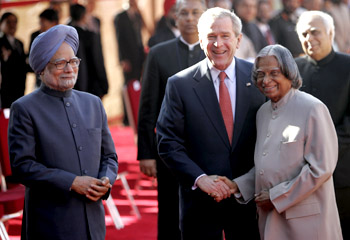|
dailynews |
|
|
|
|
|
OTHER LINKS |

|

|

|
India and US: converging perceptions
Time was when India was considered a natural ally of the Socialist bloc. This was particularly pronounced in the first forty decades or so after independence when the Nehruvian vision held sway in the domestic and foreign policies of India and the Cold War was a fact of international politics.
With the crumbling of the Cold War and the almost worldwide endorsement of free market principles, the structure of world politics too has changed and instead of the bipolar world of the Cold War years we now have a unipolar world with the US figuring as the world's number one hegemonic power. But this order of things too is increasingly unravelling with US economic, military and political might being steadily challenged by a host of other power centers, both in the Western hemisphere and outside. In the case of the Asiatic region the powers that the US needs to contend with are China, India and to a degree Japan. Particularly in economic terms, the last two powers could come to wield considerable influence in the coming years, although it is some time since China established itself as a principal challenge to US influence in all three components of power. This reading of world politics makes the conclusion inescapable that economic power is a prime mover of global power alignments and realignments and that economics drives politics. The proof we have at hand is the changed Indo-US equation with both states seeking active collaboration with each other in the economic sphere. There is, of course, the consensus on fighting terror which has helped in cementing Indo-US ties but it needs to be noted that India's acceptance of economic liberalization in the early nineties preceded the US-led "war on terror". Thus, economics has driven politics. US President George Bush's recent visit to India testifies to the palpability of this truth. Indo-US relations have to be viewed and analyzed on the basis of a now set of principles and among these economic liberalization and its potential for political transformation figures prominently. To be sure, India has not deviated radically from the path of pro-poor growth nor has it abandoned its egalitarian ideals but a spirit of pragmatism is increasingly informing State-level economic decision-making. Trade and investment possibilities with the West are being actively explored by India and the West in turn is seeking to make profitable use of India's expanding middle class market. There are vibrantly growing links between the US and India in the computer software manufacturing sphere with US computer firms increasingly seeking out Indian computer entrepreneurs for joint-production purposes or for the outsourcing of software manufacture. The further diversification of Indo-US links is also evidenced in the increasing political and military cooperation between the states. For instance, at the time of the Bush visit, the Pentagon announced a US offer to sell advanced fighter aircraft to India with a view "to providing state-of-the-art fighter aircraft in response to India's requirements for a multi-role combat aircraft". Earlier, Bush finalised an agreement with India on civilian nuclear technology which was described as being of "landmark" status. India's pro-Western position in the West's nuclear dispute with Iran offers fresh proof of changed Indian perceptions on global politics. All this and more is the proof that Indo-US ties are being rebuilt on new foundations. They are proceeding apace with the sustenance of strong US-Pakistani relations. In fact, Bush's visit to Pakistan subsequent to his ground-breaking Indian visit, is the evidence that anything has hardly changed in US-Pakistani ties. However, growing Indo-US relations could have the impact of containing divisive regional politics centred a round Indo-Pakistani ties on account of the US being a "common friend" to both states. |
 INDO-US TIES: In the world of Realpolitik, alliances among states are
a "most fleeting thing". This has been repeatedly proved in this part of
the world and nothing bespeaks the validity of this axiom more than
Indo-US relations.
INDO-US TIES: In the world of Realpolitik, alliances among states are
a "most fleeting thing". This has been repeatedly proved in this part of
the world and nothing bespeaks the validity of this axiom more than
Indo-US relations. 


